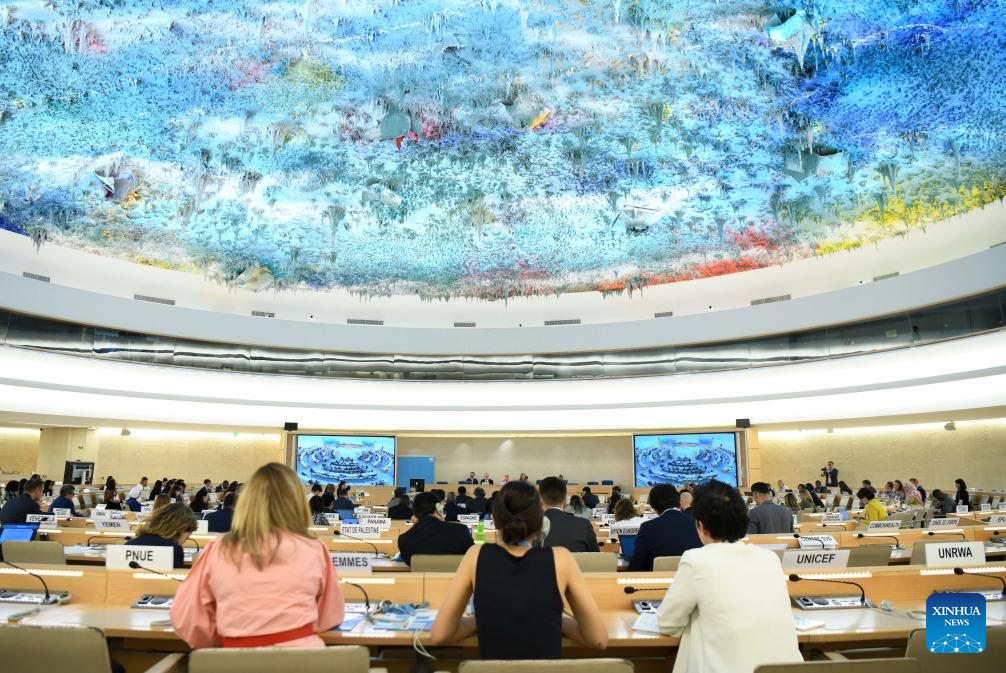Published: July 06,2024

Participants attend the 56th session of the United Nations (UN) Human Rights Council in Geneva, Switzerland, on July 1, 2024. /Xinhua
The United Nations Association of China (UNA-China) hosted a side event titled “Contribution of the Chinese Modernization to the Promotion and Protection of Human Rights” during the 56th Session of the United Nations Human Rights Council on Thursday at Palais des Nations, Geneva. The meeting saw participation from representatives of the diplomatic corps in Geneva, UN organizations, civil society organizations from China and beyond, and the media.
Panelists stated that in the process of Chinese modernization, China adheres to the path of human rights development that conforms to the trend of the times and suits its national conditions. China gives top priority to the rights to subsistence and development. As a developing country with more than 1.4 billion people, China has brought about a historic resolution to the absolute poverty and built a moderately prosperous society as a whole.
China is committed to high-quality development, featuring technological innovation and environmental protection, to achieve harmonious coexistence between human and nature. China upholds peaceful development, has put forward three initiatives on development, security and civilization, and champions human rights protection by ensuring security, advancing development and enhancing cooperation. China is committed to building an open, inclusive, clean and beautiful world that enjoys lasting peace, universal security and common prosperity.
Participants stressed that the current international security and economic situation poses multiple challenges to human rights. They highlighted that the Chinese path to modernization has provided valuable insights into the healthy development of global human rights. Emphasizing the importance of prioritizing development, they noted that the right to development is especially crucial for the Global South. Developed countries cannot overlook the rights to subsistence and development, as many of them still face urgent issues such as poverty, hunger and child malnutrition. Promoting common security is essential to creating a more peaceful international environment for the realization of human rights.
The importance of engaging in exchanges and mutual learning was also stressed. Panelists noted that countries have different national conditions and development tasks, making it natural for them to choose different paths to human rights. There is no single model for human rights. Respecting the diversity of civilizations and the unique human rights paths chosen by each country is crucial. By strengthening exchanges and mutual learning, countries can promote the common development of global human rights.
The participants emphasized the need to uphold equity and justice, noting that some developed countries consistently apply double standards on human rights issues. They pointed out that while these countries allow their own enterprises to profit, they often use human rights as a pretext to suppress the industry and commerce of Global South nations. The participants called on all countries to firmly oppose the politicization of human rights and reject any attempts to interfere in the internal affairs of other nations or hinder their development under the pretext of human rights.
Participants also called on the UN Human Rights Council and other multilateral human rights bodies to adhere to the principles of impartiality, objectivity and non-selectivity in their work. They urged these bodies to correct the tendency to prioritize civil and political rights over economic, social and cultural rights, and to accelerate the implementation of the right to development. The participants emphasized that the UN human rights system should genuinely serve as a platform for dialogue and cooperation.
Hu Wenli, vice-president and director-general of UNA-China, chaired the session. Keynote speeches were delivered by prominent figures including Cheng Jingye, president of the China Arms Control and Disarmament Association and former Chinese ambassador to Australia; Ren Yisheng, former Chinese ambassador to Liberia and executive board member of UNA-China; Li Xin, senior research fellow at the Institute for International Strategic and Security Studies and executive director of the SIIS Center for International Communications; Jasdev Singh Rai, director of the Sikh Human Rights Group; and Tom Zwart, professor of cross-cultural law at Utrecht University.
cgtn.com
 Africa -China Review Africa -China Cooperation and Transformation
Africa -China Review Africa -China Cooperation and Transformation
